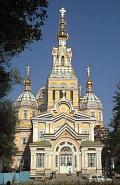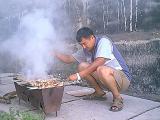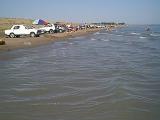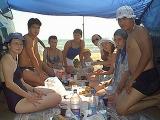



|
In Kazakhstan you can buy everything, not only standard products in plenty of recently opened luxurious supermarkets, but also university diplomas, certifications, tanks, combat aircrafts and other useful things. The corruption is pervasive as it probably is all countries in Central Asia. State servants are dependent on additional "little money" because of their low monthly. The rector of the university is overseeing the sale of diplomas personally as it is the only income to finance his school. In the hotels and discotheques, another paying service is popular: women and young men offer taking hard dollars in exchange of "personal service".
The dramatic change of life in Kazakhstan becomes apparent in the former capital Almaty, which we had visited last time in 1993. Now, the streets are lighted and roads paved, advertisements in all colors are in sharp contrast to the gray official color of party buildings. Cafes, restaurants and casinos have sprung up everywhere filled mostly with young rich people. The free market has created opportunities for them, which they have happily embraced. Nearby, old women beg for alms and "pensioners" search dustbins for eatables. Their monthly pension is not even enough to order a single meal in the restaurant. On pager, Kazakhstan is one of the richest countries in the world. Estimated oil reserves are more than 10 millions barrels per head. Owing to the badly organized economy, the population hardly ever sees any part of this fortune. The average monthly income is around 100 USD per family, comparable to the neighboring newly formed independent states. The quality of meals in these newly opened cafes and restaurants is astonishingly good. Also, Almaty boosts several hundred clubs, discos and the like for nightly excursions. We visit the "Neutralnaya Zona", a popular club in the outskirts of Almaty, where the entry is invisible from the outskirts. People are dancing and drinking wildly until early in the morning. The place is not at all gay as its name and reputation may suggest!
In Almaty, we are renting a 3-bed room apartment in a typical complex outside of the time. The tenant is a German teacher, who is renting out her apartment to make her life as her job is paying less than 100 USD per month. In 1995, the capital of the country was relocated to Astana in the northern part of Kazakhstan, as Almaty was too close to China and Kyrgyzstan. Astana was created as new city and most state offices were transported into the empty town in the middle of the steps. However, the most important government agencies are in Almaty as people are not willing to move. Almaty is lying on the feet of the Tien Shan, a very green city with lots of vegetation and the biggest apples on earth. The name "Almaty" in fact means father of the apple. The nearby natural parks and mountain resorts offer all kinds of sports and walks. As everywhere in Central Asia, the presence of the police is worth mentioning. During a trip into the nearby national park (very worth seeing with rare species, waterfalls and mountains) the criminal police stops us on the road. In the nearby woods, they had just found a murdered man, who must have been lying there for a few days given the penetrating smell. We chat a while with the officers, who seem more interested in checking our passports than in investigating the murder case.
Hiring killers is another favorite expenditures for the rich in Kazakhstan. The local newspaper reports about the recent murder of an industry tycoon, who was also selling weapons from the stocks of the Soviet army in large quantities to Iraq and the Congo. The contracted sum was reported to the authorities as USD 12 million and the list of weapons included combat aircraft, tanks and other heavy machinery. The paid amount of money was obviously much higher and it seems that somebody was unhappy about his share received, such that the industry tycoon was eliminated.
Foreigners are required by law to register with the local authorities, wherever they stay. The procedure asks an official invitation letter, a valid visa, proof of stay at the registered hotel and some other papers, which we never figured out. We visit the office in Almaty on Thursday, just to learn that it was closed. The sign outside the door simply said "profilaktitsheski dien", which means "day of prophylaxis". However, nobody knows what this could mean. The day after, the office is crammed with people. The office clerk would take passports only between 11 and 12 o'clock and a long waiting line of people (mostly Chinese traders and some European travelers) had formed. The small office smells from seat and rubber. We stand in line for about an hour and just make it to the clerk-lady around 12. The lady in police uniform makes it clear that there are a few papers missing which we could get from another nearby office and that we should come again next week. Also, our visa had already been stamped when we were transiting Kazakhstan for a few hours on the trip from Tashkent to Bishkek, which leads through Kazakh territory and the day of the stamp indicated a date on which we were not yet allowed to enter Kazakh territory according to our visa. To explain this situation to a strong minded Kazakh police lady seemed impossible to us. Luckily, we leave the unfriendly place without registering. In fact, the registration process only consists of writing the name, place of stay and passport numbers in a large book. We see no computers around, which leads us to believe that this exercise is completely useless anyway, as any border guards would not see whether we had registered or not and that bribing was always an option.
After a week, we decide to take a bus to Urumqi in China, some 1500 km and 36 hours away. The bus is scheduled to leave at Almaty every morning at 8 a.m. and tickets are 50 USD (the service is mentioned also in the Lonely Planet and other books). We buy two tickets in advance and await the bus early in the morning. However, no bus is coming and we learn that most of the time, the bus is not running due to lack of passengers. We seem to be the only travelers indeed! As our visa is expiring, we decide to take a taxi to drive us to the Chinese boundary town, some 400 km north of Almaty. It takes us about 2 hours to negotiate a reasonable price, but finally a driver agrees to take us there for 40 USD. The drive along the Ili river surrounded by desert mountains is quite scenic. The taxi driver also seems to know the standard trick and stops at the border town, not the actual border, which is another 10 miles away. So, we have to pay some extra dollars to get there. The border post is not officially listed to be open for foreigner's and we learn that it was closed completely for 4 days. Luckily the border is open for us today, and we are glad to be able to leave Kazakhstan with its bureaucracy and the greed of its officials. By the way, no one complains about our visas or non-registration and we don't have to pay any bribes or fines.
|
|